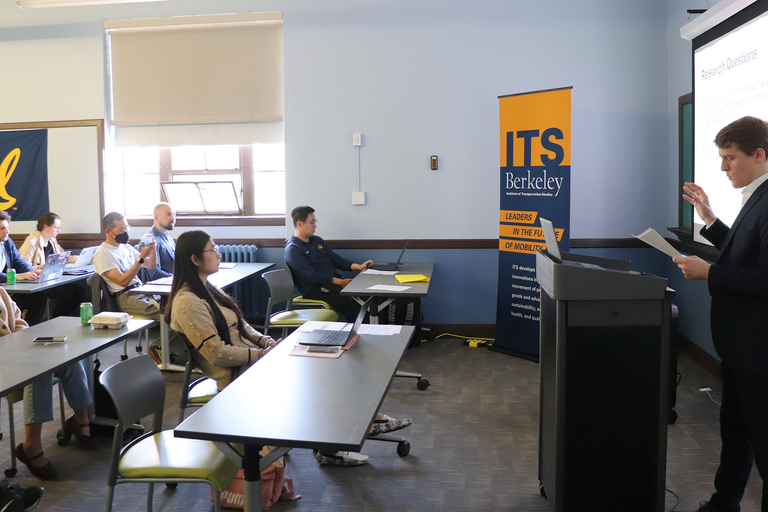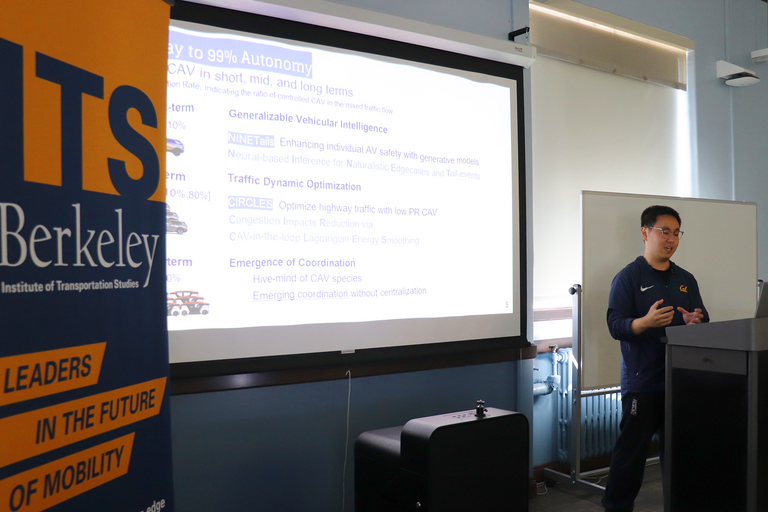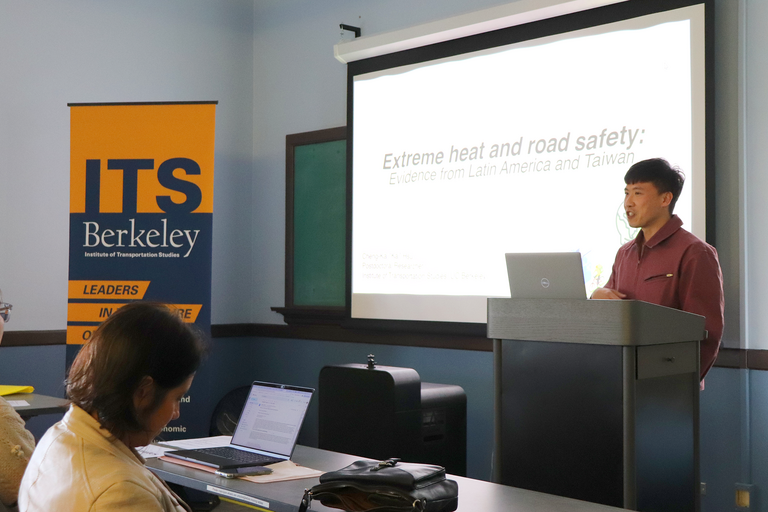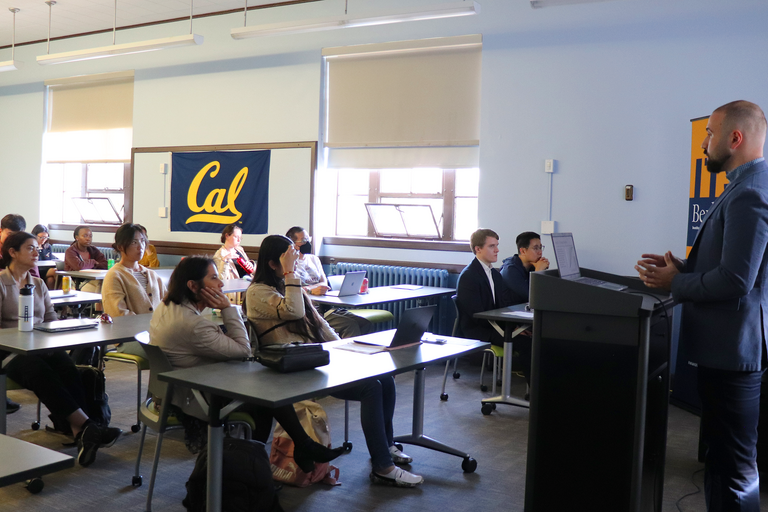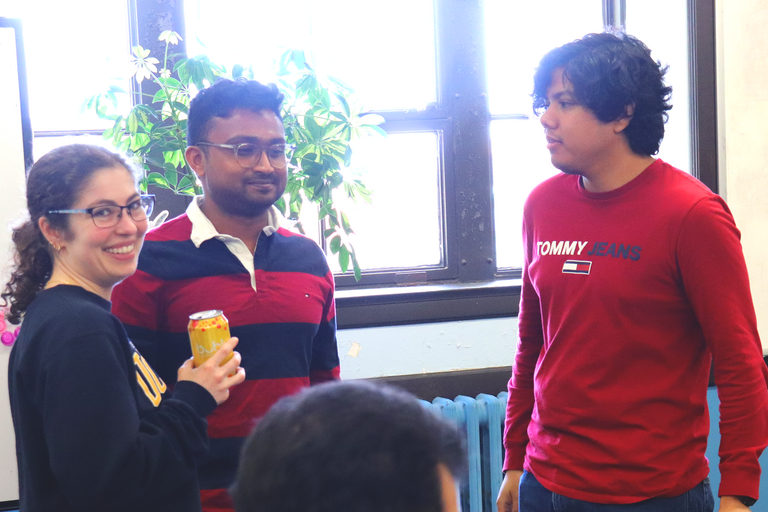The Institute of Transportation Studies celebrated the research of graduating doctoral candidates at a special PhD Transportation Seminar on Friday, May 2, 2025.
- Wesley Darling (CEE) - Advised by Professor Michael Cassidy
Can subsidized TNCs trump microtransit in non-urban settings?
Abstract: This research examines whether subsidized transportation network company (TNC) services, such as Uber and Lyft, can offer non-urban communities better service at a lower cost than microtransit. While microtransit reduces per-trip costs through trip consolidation, it struggles in low demand areas where consolidation is impractical. In contrast, TNCs provide flexible, direct service without relying on consolidation, but they are often seen as uncooperative partners by communities. To address this challenge, we first propose a business plan that uses financial incentives managed by a third-party service manager to encourage TNC cooperation. We then evaluate where subsidized cooperative TNC services could be most effective, starting with three Northern California communities as case studies, and extending the analysis across California using a newly developed consolidation metric.
Bio: Wesley is a PhD candidate in Transportation Engineering at UC Berkeley. Wesley has received an MS in Transportation Engineering from UC Berkeley, a BS in Civil Engineering from the University of Tennessee, Knoxville, and a BS in Business Administration (with Minors in Screenwriting and Physics) from the University of North Carolina at Chapel Hill.
- Han Wang (CEE) - Advised by Maria Laura Dell Monache
From Connected to Coordinated – Distributed Intelligence and Centralized Coordination for Connected Autonomous Vehicles
Abstract: As connected and autonomous vehicles (CAVs) become increasingly integrated into modern transportation systems, the transition from mere connectivity to full coordination is essential for achieving efficiency, safety, and resilience. This seminar explores how distributed intelligence and centralized coordination can optimize traffic flow in mixed autonomy conditions, leveraging insights from the CIRCLES project—the world’s largest open-track field experiment deploying 100 CAVs on the I-24 MOTION testbed. We will discuss how reinforcement learning and real-time control mechanisms enable AVs to mitigate congestion with minimal penetration rates, achieving an 8% improvement in overall traffic efficiency. The session will also highlight key technical challenges, such as multi-agent decision-making, human-vehicle interactions, and large-scale deployment strategies.
Bio: Han Wang(https://hanwcal.github.io/) is a Ph.D. candidate at UC Berkeley, affiliated with Berkeley Artificial Intelligence Research (BAIR) and Berkeley Deep Drive (BDD). In the CIRCLES project, he lead the developing real-time speed optimization for 100 CAVs and the full-backend development in the largest open-road field test to improve traffic flow. At BDD, He led the Predictive Occupancy Risk Assessment (PORA) project, creating probabilistic risk metrics and simulation-based safety evaluation for AVs in mixed traffic. Beyond his doctoral research, he explores AR/VR and LLM applications in simulation and game development, with awarded publication in Human-Computer Interaction(HCI) conferences.
- Cheng-Kai Hsu (DCRP) - Advised by Professor Daniel A. Rodriguez
Extreme heat and road safety: Evidence from Latin America and Taiwan
Bio: I am a Postdoctoral Researcher at the Institute of Transportation Studies, University of California, Berkeley. My research interests lie at the intersection of Road-traffic Safety, Climate Health, Environmental Equity, and Causal Inference. I hold a PhD in City and Regional Planning from UC Berkeley, a Master of Science in Transport from Imperial College London and University College London, and a Bachelor of Science in Urban Planning from National Cheng Kung University, Taiwan.
Abstract: This presentation examines how ambient heat influences the risk of road-traffic mortality across 272 cities in six Latin American countries, from Mexico to the Southern Cone. It highlights variations in heat-related risks by individual and city-level characteristics. The talk also explores a behavioral mechanism underlying these risks, drawing on findings from a wearable-sensing study of 40 gig economy motorcyclists in Taiwan.
- Ziad Yassine (CEE) - Advised by Professor Susan Shaheen
Can Electric Vehicle Carsharing Improve Grocery Access in Underserved Communities? A Case Study of BlueLA
Abstract: Electric vehicle (EV) carsharing has re-emerged as a strategy to reduce greenhouse gas (GHG) emissions and expand access to transportation in underserved communities. While traditional carsharing is well-documented in terms of environmental and mobility benefits, its electrified counterparts raise new questions about social equity, usage, and long-term viability. My dissertation evaluates the impacts of one-way EV carsharing across three dimensions: environmental outcomes, user retention, and access to essential services such as grocery shopping. I use BlueLA, an income-tiered one-way EV carsharing program in Los Angeles, as a case study and analyze trip activity data, user and non-user surveys, and external spatial data. In this talk, I will focus on the most recent findings from a study exploring whether EV carsharing has the potential to improve access to grocery stores among underserved households. While transportation is one determinant of food security, existing research typically relies on static measures of proximity. Building on prior work, this study extends these approaches by developing a spatial-temporal accessibility model that incorporates travel time, store operating hours, and trip costs to assess access to grocery stores via EV carsharing. I will also discuss differences in perceived access across user groups and the implications for mobility equity and service improvement.
Bio: Ziad Yassine is a Ph.D. candidate in Civil and Environmental Engineering at UC Berkeley. His dissertation evaluates the impacts of one-way EV carsharing on GHG emissions, user retention, and access to grocery stores using BlueLA, an income-tiered carsharing program in Los Angeles, as a case study. Ziad began working with the Transportation Sustainability Research Center (TSRC) at UC Berkeley before starting his Ph.D. in 2021 and has continued as a graduate student researcher throughout his doctoral studies. During his Ph.D., he also interned with Zipline’s research team, where he worked on geospatial and user behavior modeling in the context of drone delivery. He holds a B.E. in Civil Engineering (2018) from the American University of Beirut and an M.S. from UC Berkeley (2019).

